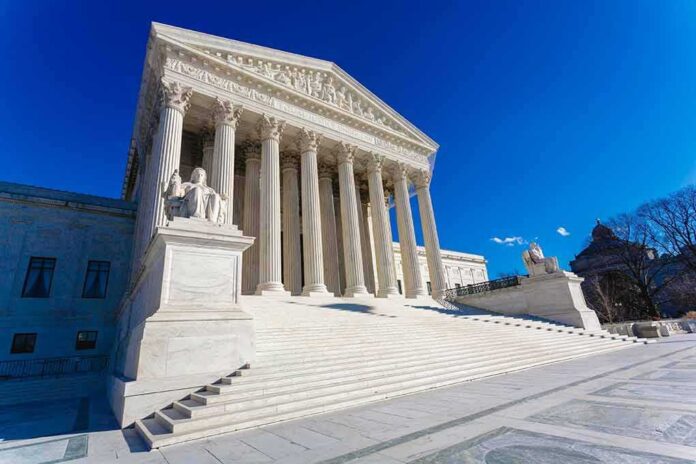
The U.S. Supreme Court is set to hear a pivotal case on state authority over transgender healthcare for minors, potentially reshaping the landscape of medical interventions for youth across the nation.
At a Glance
- Supreme Court to review Tennessee law restricting gender-affirming care for transgender minors
- Case stems from Biden administration’s appeal to block state bans on such treatments
- Decision could impact similar laws in 25 states that restrict or ban gender-affirming care
- Arguments scheduled for fall, with potential far-reaching consequences for transgender rights
- Case highlights ongoing tension between state authority and individual rights in healthcare
Supreme Court to Address Contentious Issue
The U.S. Supreme Court has agreed to hear a case that could have significant implications for transgender healthcare across the country. The court will review a Tennessee law that restricts access to puberty blockers and hormone therapy for transgender minors, a decision that comes amid a growing national debate on the rights of transgender individuals and the extent of state authority in healthcare matters.
The case, which will be argued in the fall, stems from an appeal by the Biden administration to block state bans on gender-affirming care for transgender youth. This move highlights the ongoing tension between Republican-led states implementing restrictions on transgender rights and the Democratic administration’s efforts to extend protections for the LGBTQ+ community.
We know it’s clear: Trans youth deserve the same chance to thrive as their peers. Trans youth deserve a future. Gender-affirming care is life-saving care, and we’re ready to stand for it boldly. Tennessee, we’ll see you in court. ⁰—⁰Stay tuned for more. https://t.co/U8leiDOthU
— ACLU of Tennessee (@aclutn) October 18, 2024
State Restrictions and Legal Challenges
The Tennessee law at the center of this case is part of a broader trend across the United States. South Carolina recently became the 25th state to either restrict or ban gender-affirming medical care for transgender minors, underscoring the widespread nature of this issue. Many of these state restrictions are currently facing legal challenges, with the Supreme Court’s decision potentially setting a precedent for how these cases will be resolved. “Without this Court’s prompt intervention, transgender youth and their families will remain in limbo, uncertain of whether and where they can access needed medical care”, Stated the lawyers for the transgender teens in Tennessee
The urgency of this issue is reflected in the statement above, highlighting the real-world impact these legal battles have on transgender youth and their families. The Supreme Court’s decision to hear this case indicates the importance and complexity of balancing state authority with individual rights in healthcare decisions.
Broader Implications for Transgender Rights
While the Supreme Court has previously ruled that civil rights laws protect transgender individuals from employment discrimination, it has rarely addressed transgender issues directly. Notable exceptions include cases involving bathroom access for transgender students. This upcoming case, therefore, represents a significant moment in the Court’s engagement with transgender rights and could have far-reaching consequences.
The case has garnered attention from various quarters, with actor Elliot Page and 56 other transgender individuals supporting the Supreme Court review. This high-profile support underscores the case’s importance to the transgender community and its potential to shape the future of healthcare access for transgender youth across the United States.
As the nation awaits the Supreme Court’s decision, it’s clear that this case will be a defining moment in the ongoing debate over state authority, individual rights, and the ethical considerations surrounding medical interventions for transgender minors. The outcome could significantly impact how states regulate such treatments and shape the landscape of transgender healthcare for years to come.
























